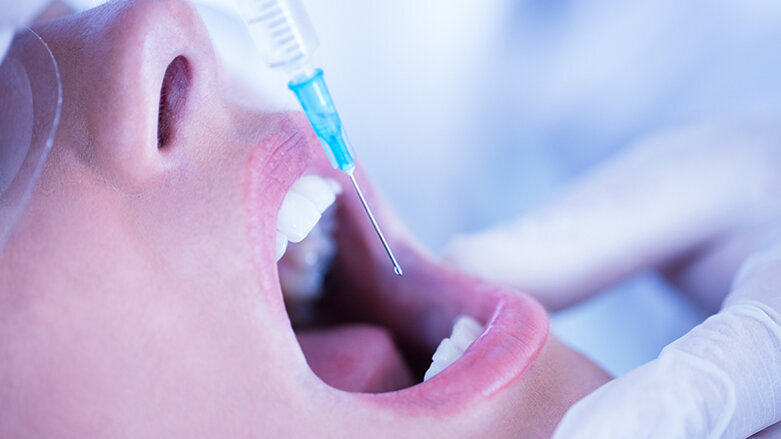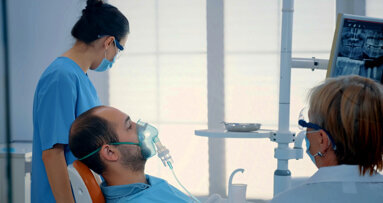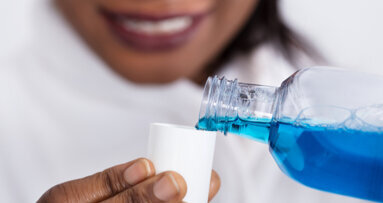LUBBOCK, Texas, U.S.: Fear of injections is not an uncommon condition, and when coupled with a fear of dentists, some people may avoid dental treatment until the absolute last minute. In new research, scientists from Brazil and the U.S. are testing a strategy to increase the effectiveness of topical anesthesia used in dentistry. Their hope is to reduce patient discomfort and ensure the anesthetic can reach further into the mucosa.
For their study, researchers from Texas Tech University (TTU) and the University of Campinas School of Dentistry of Piracicaba developed a small device that contains 57 microneedles. When this device is placed on the gingivae, cheek or any other location of the mouth to be anesthetized, it creates tiny holes through which anesthetic medications, like lidocaine, can penetrate deeper into regions of the oral mucosa.
According to lead researcher Dr. Harvinder Singh Gill, Associate Professor and Whitacre Endowed Chair of Science and Engineering at TTU, conventional methods of topical anesthesia cannot completely assure protection for the patient. This is particularly true when a deep injection is needed to block a nerve. “That situation causes anxiety for patients and dentists alike, and could compromise the treatment outcome,” said Gill.
Although to date the device has only been tested on ten patients, according to Gill, the outcomes have been positive. However, pain reduction of the injection is not the only area of interest. Other objectives of the study are to measure the pain caused by the 700 μm microneedles, as well as to determine the effectiveness of the system in expanding the area of the topical anesthesia.
The research was funded by the São Paulo Research Foundation and carried out under the scope of its São Paulo Researchers in International Collaboration program.
Tags:
L’AQUILA, Italy: In a new study, researchers at the University of L’Aquila in Italy have highlighted the importance of oral health for patients with ...
TAIPEI, Taiwan: The debate on climate change and its effects on the earth are a hot topic. One discussion, in particular, is around air pollution, which is ...
OSAKA, Japan: People living with Type 2 diabetes have been reported to experience a higher incidence of dental caries, but the biological pathways ...
CAIRO, Egypt: Previous studies have linked poor oral hygiene with hyper-inflammation and cardiovascular disease. Similarly, the severity of COVID-19 has ...
Anaesthesia policy in dentistry is an increasingly controversial topic. Sedation and anaesthesia failures can lead to patient injury, and deaths have made ...
School-based oral health programs are vital to ensuring that the oral health of a country’s youth population remains of a good standard. However, as with ...
SEATTLE, U.S.: Owing to its easy application, its affordable price and the low risk of swallowing the product, fluoride varnish (FV) has become a popular ...
SINGAPORE: The Association of Orthodontists (Singapore) Congress (AOSC) has reinforced its status as a leading event for orthodontic professionals with a ...
LEIOA, Spain: The human oral cavity is populated by a variety of bacteria. Surgical procedures in the mouth thus pose the risk of bacteria passing into the ...
LEIPZIG, Germany: The dental support organisation (DSO) model has undergone significant transformation over the past few decades, reshaping the global ...
Live webinar
Tue. 24 February 2026
1:00 pm EST (New York)
Prof. Dr. Markus B. Hürzeler
Live webinar
Tue. 24 February 2026
3:00 pm EST (New York)
Prof. Dr. Marcel A. Wainwright DDS, PhD
Live webinar
Wed. 25 February 2026
11:00 am EST (New York)
Prof. Dr. Daniel Edelhoff
Live webinar
Wed. 25 February 2026
1:00 pm EST (New York)
Live webinar
Wed. 25 February 2026
8:00 pm EST (New York)
Live webinar
Tue. 3 March 2026
11:00 am EST (New York)
Dr. Omar Lugo Cirujano Maxilofacial
Live webinar
Tue. 3 March 2026
8:00 pm EST (New York)
Dr. Vasiliki Maseli DDS, MS, EdM



 Austria / Österreich
Austria / Österreich
 Bosnia and Herzegovina / Босна и Херцеговина
Bosnia and Herzegovina / Босна и Херцеговина
 Bulgaria / България
Bulgaria / България
 Croatia / Hrvatska
Croatia / Hrvatska
 Czech Republic & Slovakia / Česká republika & Slovensko
Czech Republic & Slovakia / Česká republika & Slovensko
 France / France
France / France
 Germany / Deutschland
Germany / Deutschland
 Greece / ΕΛΛΑΔΑ
Greece / ΕΛΛΑΔΑ
 Hungary / Hungary
Hungary / Hungary
 Italy / Italia
Italy / Italia
 Netherlands / Nederland
Netherlands / Nederland
 Nordic / Nordic
Nordic / Nordic
 Poland / Polska
Poland / Polska
 Portugal / Portugal
Portugal / Portugal
 Romania & Moldova / România & Moldova
Romania & Moldova / România & Moldova
 Slovenia / Slovenija
Slovenia / Slovenija
 Serbia & Montenegro / Србија и Црна Гора
Serbia & Montenegro / Србија и Црна Гора
 Spain / España
Spain / España
 Switzerland / Schweiz
Switzerland / Schweiz
 Turkey / Türkiye
Turkey / Türkiye
 UK & Ireland / UK & Ireland
UK & Ireland / UK & Ireland
 Brazil / Brasil
Brazil / Brasil
 Canada / Canada
Canada / Canada
 Latin America / Latinoamérica
Latin America / Latinoamérica
 USA / USA
USA / USA
 China / 中国
China / 中国
 India / भारत गणराज्य
India / भारत गणराज्य
 Pakistan / Pākistān
Pakistan / Pākistān
 Vietnam / Việt Nam
Vietnam / Việt Nam
 ASEAN / ASEAN
ASEAN / ASEAN
 Israel / מְדִינַת יִשְׂרָאֵל
Israel / מְדִינַת יִשְׂרָאֵל
 Algeria, Morocco & Tunisia / الجزائر والمغرب وتونس
Algeria, Morocco & Tunisia / الجزائر والمغرب وتونس
 Middle East / Middle East
Middle East / Middle East












































To post a reply please login or register